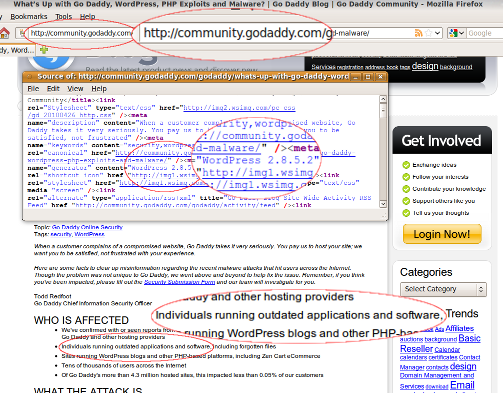Yesterday I blogged about the hacking situation with GoDaddy hosting and a customer service call I had with them concerning some evidence I had found. While it is true that as this has progressed GoDaddy has widened their scope in investigating what the underlying cause of these hacks are, initially they claimed that the issue was with their customers running outdated versions of WordPress. While being wrong about something like that is usually not that big of a deal, in this particular instance it proved to be beyond irksome, since a large portion of their customer base were told that it was their own fault that their sites got hacked (even in cases where the customer was up to date), and that GoDaddy was in no way to blame:
WordPress is a-ok. Go Daddy is rock solid. Neither were ‘hacked,’ as some have speculated.
After an extensive investigation, we can report there was a small group of customers negatively impacted. What happened? Those users had outdated versions of the popular blogging software, set up in a particular way. – Alicia from GoDaddy
From what I have read around the web customers were being told that it was not GoDaddy’s responsibility to fix the sites, that they only offered “limited support” in situations like this, leaving people with only the option of restoring from a backup (which would often not help even in outdated WordPress hack situations, since hacks can go undetected for months) or hiring outside help to clean things up.
You can see on the support page they have set up, What’s Up with Go Daddy, WordPress, PHP Exploits and Malware? that they still claim that outdated scripts are part of the problem. Going to that page and viewing the source reveals something almost unbelievable:

(click to enlarge)
That’s right, in a classic “do as I say, not as I do” twist it seems that GoDaddy is in fact running an older version of WordPress (WordPress MU, based on the version number, which has the same security holes as regular WordPress) for their community blog that they are using to tell people to upgrade their WordPress versions.
To be fair, simply having an older version of WordPress does not mean that it is automatically insecure… the security fixes in the more recent versions may be minor and the known vulnerabilities might have been manually patched. I can’t know without actually digging deeper and looking if in fact the installation was vulnerable.
Then again… neither can GoDaddy in the case of their customers.


 Again, I’ve been hacked. Well, not me personally… I wear the most up to date tinfoil attire, I assure you, and no one is getting into my head… but my blog was. This time I was running WordPress 2.6.5 when it happened.
Again, I’ve been hacked. Well, not me personally… I wear the most up to date tinfoil attire, I assure you, and no one is getting into my head… but my blog was. This time I was running WordPress 2.6.5 when it happened.  Adding images to your blog posts can make them much more visually appealing to your readers. This in turn can increase the likelihood that someone will link to that post or subscribe to your feed, which will of course in the long run help to improve your rankings and traffic. The internet is chock full of images, many of which will fit perfectly with that blog post or article that you are writing. The problem is, however, finding images that are both high quality and that you are actually allowed to use.
Adding images to your blog posts can make them much more visually appealing to your readers. This in turn can increase the likelihood that someone will link to that post or subscribe to your feed, which will of course in the long run help to improve your rankings and traffic. The internet is chock full of images, many of which will fit perfectly with that blog post or article that you are writing. The problem is, however, finding images that are both high quality and that you are actually allowed to use. Over the past couple of weeks, one of the biggest concerns about SEOmoz’s new Linkscape tool (which I recently blogged about in reference to the
Over the past couple of weeks, one of the biggest concerns about SEOmoz’s new Linkscape tool (which I recently blogged about in reference to the  For years now, on an on-again/off-again basis, Google has had issues with the way that they treat 302 Temporary Redirects. Going back at least as far as 2004, you can
For years now, on an on-again/off-again basis, Google has had issues with the way that they treat 302 Temporary Redirects. Going back at least as far as 2004, you can